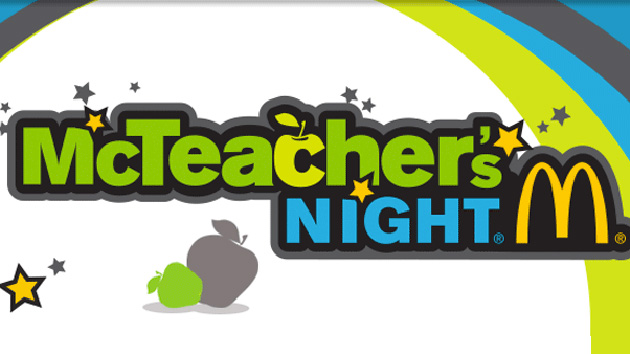Ah, McTeacher’s Night—the occasion for kids to watch their teachers peddle burgers, fries, and sugary drinks. In these tie-ups between schools and the fast-food giant, teachers encourage their students and their families to visit a McDonald’s outlet on a particular evening, and then work behind the counter (uncompensated) in McDonald’s t-shirts. A portion of the night’s sales are donated to the school. The above video depicts one such event held for an Illinois high school in 2012.
Sound like an edifying spectacle for youth? A labor union called United Teachers Los Angeles thinks not. In a blistering letter recently published in its union newspaper, UTLA vice president Cecily Myart-Cruz lays out the case against McTeacher’s Night. She claims that the events amount to “predatory marketing of fast food to children,” “exploits the trust between teachers and students to promote its junk food,” and “often raise as little as $1 per student, a ridiculously small amount compared to the time teachers must spend participating and recruiting their students to attend.”
In an emailed statement, a McDonald’s spokesperson defended the program:
McTeacher’s Night is an optional community-based program that supports schools seeking financial support for initiatives like sports equipment, band uniforms, iPads for the classroom, field trips and other programs. It is not a corporate mandated program, but a way our company-owned and franchised restaurants support the communities they serve at the request of and in partnership with local schools.
Like the sweet sauce that tops a soft-serve sundae, the LA teachers union critique comes after a campaign launched last year to kibosh McTeacher’s Nights, led by advocacy groups Corporate Accountability International and Campaign for a Commercial-Free Childhood and and supported by 50 national, state and local teachers unions.
A spokesperson for Corporate Accountability International pointed out to me in an email that McTeacher’s Night events contradict sponsorship guidelines (downloadable here) issued by the Los Angeles Unified School District (LAUSD) in 2011. The guidelines state: “Keep in mind we may not accept donations from or promote organizations that market, sell or produce products that may be harmful to children including but not limited to, tobacco, alcohol, firearms, gambling, or high fat and calorie foods and drinks.”
Using Freedom of Information Act requests, Corporate Accountability International and Campaign for a Commercial-Free Childhood have documented more than 120 McTeacher nights in greater LA since the start of 2013, including four this year. Their research suggests that the funds these events raise tend to be paltry. They obtained fundraising totals for around 30 LA-area McTeacher nights, for which the cash haul ranged from $67 to $1,000. Nationwide, the groups have counted more than 600 McTeacher Nights since 2013.
On Monday, the UTLA announced a formal policy “calling on McDonald’s to end these disrespectful marketing gimmicks once and for all,” Myart-Cruz said in a statement.
Like a class clown who doesn’t know when to stop, Ronald McDonald would appear to be no longer welcome as a fixture in LA public schools.












